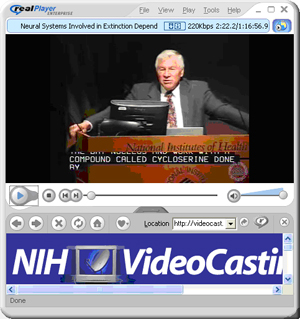Archived Content
The National Institute of Mental Health archives materials that are over 4 years old and no longer being updated. The content on this page is provided for historical reference purposes only and may not reflect current knowledge or information.
Medication-Enhanced Learning in Therapy Hailed as “Paradigm Shift” for Anxiety
• Science Update
A medication that enhances learning, taken just before an exposure therapy session, may aid cognitive behavior therapy (CBT) for anxiety disorders, say NIMH-funded researchers, who adapted the technique from studies in rats.
D-cycloserine, is used to “specifically enhance the efficacy of the emotional learning process that takes place in psychotherapy and hopefully make these new emotional memories more robust and long-lasting,” explained psychologist Barbara Rothbaum, Ph.D., an NIMH grantee at Emory University, in an editorial in the March 2008 issue of the American Journal of Psychiatry (AJP). She heralded the new approach as “a paradigm shift.”
So far, D-cycloserine enhanced psychotherapy has been found effective for social phobia in two studies, and for obsessive compulsive disorder (OCD) in two out of three studies, according to Rothbaum. A report on the second successful trial of the technique for OCD by Sabine Wilhelm, Ph.D., and colleagues at Massachusetts General Hospital is published in the same issue of AJP. With NIMH grant support, Rothbaum and colleagues are currently testing a D-cycloserine-enhanced virtual reality-based exposure therapy for Iraq veterans suffering from post-traumatic stress disorder (PTSD).
D-cycloserine, an antibiotic, is normally prescribed at a 10-fold higher dose to treat tuberculosis. The effects of the single low dose given prior to CBT exposure therapy sessions are usually imperceptible to patients and last just a few hours. Yet animal studies show that the medication interacts with a receptor in the brain’s fear hub to facilitate what is known as extinction learning – learning to be less fearful.
“This line of research crosses the boundaries of behavior and biology, revealing how understanding basic physiological processes underlying fear can translate into improving therapies for people with anxiety disorders,” said NIMH grantee Michael Davis, Ph.D., of Emory University, whose pioneering studies in rats led to the clinical innovation.
Davis and colleagues had been exploring the workings of a pivotal receptor on cells in the brain’s fear hub, the amygdala. The receptor controls the learning and extinction of fear in response to signals from the chemical messenger glutamate. D-cycloserine binds to this N-methyl-D-aspartate (NMDA) receptor.
The researchers taught rats to fear an initially neutral stimulus, a light, by repeatedly pairing it with an aversive stimulus, a mild shock. The animals then behaved fearfully when exposed to just the light. Extinguishing the fear response required repeated exposures to the light without the shock. Davis’s team discovered that giving the rats just one dose of D-cycloserine just before these extinction training trials speeds up this safety learning process by making the NMDA receptor work better.
Davis then teamed up with Emory’s Kerry Ressler, M.D., Ph.D., and Rothbaum for a 2004 pilot study in which D-cycloserine was shown to augment exposure therapy in which people learned to conquer their fear of heights (acrophobia) during trips in a virtual glass elevator. The results spurred similar trials for other anxiety disorders.
Davis’s work “represents one of the best examples of bench-to-bedside translational research in psychiatry,” noted Robert Desimone, Ph.D., director of MIT’s McGovern Institute for Brain Research, in announcing that the Emory researcher was to be awarded the coveted Edward M. Scolnick Prize in Neuroscience in April 2008.
Videocast
Neural Systems Involved in Extinction Depend on When Extinction Occurs
Monday, October 30, 2006
Michael Davis, Ph.D., Emory University School of Medicine
Total Running Time: 01:16:56
Dr. Davis discusses the basic science of dispelling fear memories, including his discovery of how this can be enhanced with D-cycloserine, and a pilot study using it to help people lose their fear of heights.

Rothbaum BO . Critical parameters for d-cycloserine enhancement of cognitive-behaviorial therapy for obsessive-compulsive disorder. Am J Psychiatry. 2008 Mar;165(3):293-6. No abstract available. PMID: 18316423
Wilhelm S, Buhlmann U, Tolin DF, Meunier SA, Pearlson GD, Reese HE, Cannistraro P, Jenike MA, Rauch SL. Augmentation of Behavior Therapy With D-Cycloserine for Obsessive-Compulsive Disorder. Am J Psychiatry. 2008 Feb 1; [Epub ahead of print] PMID: 18245177
Davis M, Ressler K, Rothbaum BO, Richardson R. Effects of D-cycloserine on extinction: translation from preclinical to clinical work. Biol Psychiatry. 2006 Aug 15;60(4):369-75. Review. PMID: 16919524
